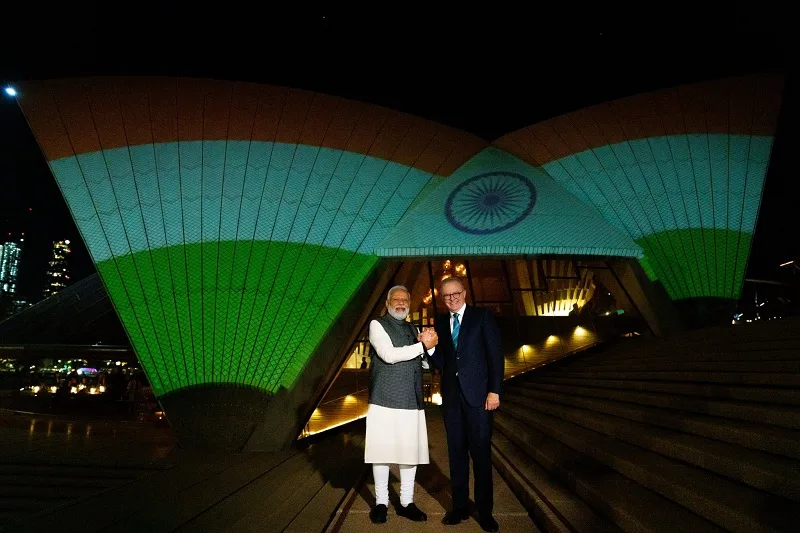

Prime Minister Narendra Modi with Australian Prime Minister Anthony Albanese at the Sydney Opera House on Wednesday evening (Image courtesy: PMO, Australia)
The sails of the Sydney Opera House glowed in the tricolour hues of the Indian flag on Wednesday, celebrating the deepening of the multifaceted India-Australia Comprehensive Strategic Partnership and honouring Prime Minister Narendra Modi’s first visit to the country since 2014.
The Indian flag was projected onto Australia’s most recognisable building amid a raging domestic controversy over whether the sails should be illuminated or not after they were not lit up for the coronation of King Charles III, earlier this month.
Citing that the symbolic gesture involves high spending – anywhere between $80,000 to $100,000 – the New South Wales Premier Chris Minns had then defended the decision, stating that his government will be “mindful” in approving requests for lighting up the Sydney Opera House.
Following the recent developments, Australian Prime Minister Anthony Albanese confirmed that the Federal Government is paying for the Indian flag to go on the sails Wednesday evening.
“Well, we have a decision to make about this (lighting up the Opera House in Indian tricolour), it wasn’t our decision about the King’s Coronation, state governments took various decisions around the country. The Federal Government certainly acknowledged the King’s Coronation, on all of our federal buildings in Canberra there were displays that were appropriate,” he said in a radio interview to 2GB host Chris O’Keefe on Wednesday.
One of the things about lighting up the Opera House, the Australian PM added, is that it projects Australia’s image to the world.
“They get to see it, it will mean that there is coverage. There are 1.4 billion reasons why we want the Indian flag on the Opera House, because it is the largest population in the world. Two-thirds of those 1.4 billion people are under the age of 35. We want a relationship with them, we want them to come to Australia, bring their dollars, create jobs and create that economic activity in the tourism sector,” said Albanese.
Earlier in the day, both Prime Ministers held a bilateral meeting at the Admiralty House in Sydney having discussions focused on cooperation in defence and security, trade and investment, new and renewable energy, green hydrogen, critical minerals, education, migration and mobility and people-to-people ties.
The two countries also signed the India-Australia Migration and Mobility Partnership Arrangement (MMPA), which will further facilitate the mobility of students, professionals, researchers, academics and others, including through a new skilled pathway named MATES (Mobility Arrangement for Talented Early Professionals Scheme) specifically created for India.
“That provides for 3,000 places for people who are highly skilled to come to Australia in areas that we need. We know that having people from places like Hyderabad and Bengaluru are leading the world in information technology and in so many areas, and if we can have those people come and impart their skills here, over a couple of years, which is what the visas will be for, then it will greatly benefit Australia,” commented Albanese during the radio interview.
Emphasising that India will grow to be the third-largest economy in the world in the coming years and there are “enormous advantages”, Albanese mentioned that it’s a “real opportunity” for Australian business.
Union Minister of Coal and Mines G Kishan Reddy on Tuesday held an inter-ministerial meeting…
India's largest automobile in-plant railway siding at Maruti Suzuki's Manesar facility started operation on Tuesday,…
Google on Tuesday unveiled its Safety Charter for India's AI-led transformation, at the "Safer with…
The human rights organisation of the Baloch National Movement (BNM), Paank, has published its most…
The Israel Defence Forces (IDF) on Tuesday claimed that it has killed Iran's senior-most military…
Amid escalating conflict between Iran and Israel, the Ministry of External Affairs (MEA) on Tuesday…